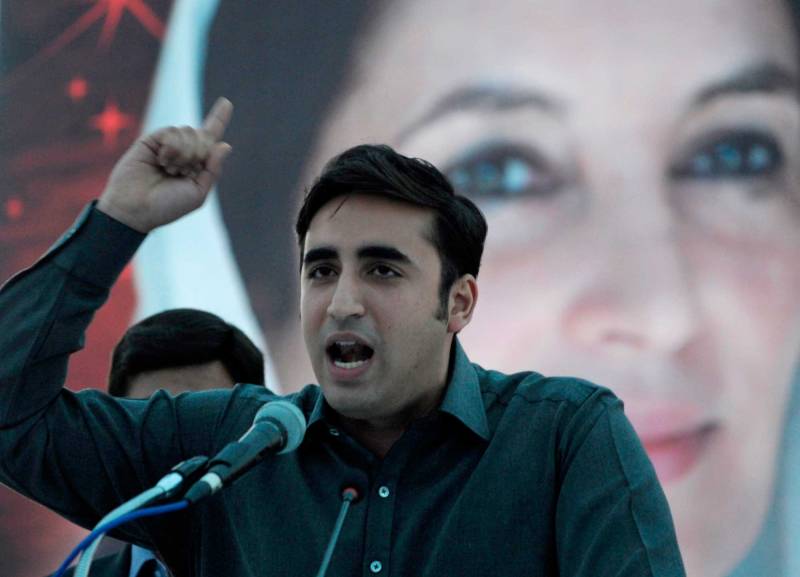Any write-up about today’s PPP has to start with the admission of bitter reality that the party has been reduced to its bastion of rural Sindh. The steep decline in party popularity set in after 2008, when Zardari donned the mantle of leadership pursuant to the late BB’s ‘will’. Initially a false hope surfaced among jiyalas that Zardari might mend his ways but, because of his nature, he refused to subdue his lowly desires and didn’t give two hoots to the future of the party. The lust for money and power unleashed an era of unchecked corruption and nepotism in Pakistan’s political history, giving free rope to coalition parties wherever they ruled. In such a situation, the outcome of the 2013 elections and the drubbing defeat in the cantonment board local bodies’ elections did not surprise anybody.
Zardari has lost all capability to reinvigorate the party and jiyalas look up to Bilawal- who has recently returned- as last hope. Earlier, according to press reports, Bilawal left the country because of his serious differences over how the party and the province are run by the incumbent leadership. Bilawal wanted to appoint honest and committed people at important positions in the province but he was not allowed by his father to shake up the rusted structure. Now he has returned and, according to party sources, he will reorganize the party in Punjab, addressing grievances of its followers. There is no argument that the PPP badly needs a leader who could sail its boat out of troubled waters. The party performance in the looming local government polls in Punjab will indicate the prospects in next general elections. Will Bilawal Bhutto be able to provide leadership to boost the dwindling fortunes of PPP?
Political observers say Bilawal has the charisma to energize and rally the followers. Bilawal has the advantage of clean record and does not have baggage like his father. Besides, he has enthusiasm of a youthful idealist unlike the co-chairperson, who has lost verve and energy to the fulfillment of his inferior passions. These benefits will not make Bilawal’s task easier unless he embarks on the assiduous task to reinvent the party’s program that responds to the needs of time. Zulfikar Ali Bhutto had done the same- he invented a catchy slogan (catchier no more), formulated a program based on socialist ideals and the public voted him in power. That he later betrayed those ideals and met his tragic fate is another story. But Bilawal has hitherto shown little inclination to modernize the party’s program. He needs the realisation that glib explanations and rhetoric slogans may work up the crowd for the moment, but will not convince the public to vote for the teer.
Ideologies of political parties have to evolve with the passage of time. To start with, Bilawal should be under no illusion that he will receive the same support, which Benazir Bhutto did in 1986 on her return from exile. A very important reason has been the change in the support base of different political parties over a period of time. Diehard followers are now advanced in years and the new generation has different expectations. PTI-in opposition looks more appealing to the youth as Imran Khan hits PPP hard on its past performance at national and provincial levels.
Instead of sticking to the outdated program and making illusory efforts to reclaim the old constituency, attempts of the PPP should be directed towards making its program appealing for the young generation.
Another key challenge for Bilawal Bhutto will be to overhaul governance in Sindh. It is an open secret that the Sindh CM cares little about the fact that his MPs have become parasites on municipal bodies, denying common people their right to essential services including the right to clean water. Media stories about corruption scandals in Sindh fail to attract attention from the party leadership that, indisputably, is a partner in crime. Of late, General Raheel Sharif has been snubbing Mr. Zardari over the state of law and order in the province but the later has felt no need of stocktaking. The image of corrupt government has done more damage to the party than any other thing. This would have to change, as perception in politics is bigger than reality.
Chief Minister Qaim Ali Shah needs a break from heavy responsibilities and should be replaced with a more efficient and active person. The exit of Qaim Ali Shah is essential to set off the process of deep reform in Sindh government. Drastic changes are needed to improve the social sector services i.e. health and education. Hundreds of schools across the province remain without teachers and are used as ‘autaaqs’ by local landlords. Likewise, thousands of such employees are drawing salaries from municipal bodies, either whose appointment orders are fake or who never come on duty. In the past, the PPP always showed her to be the victim of conspiracies of the establishment but the mantra has lost its appeal. When Imran Khan speaks about corruption and status quo maintaining proclivities of the two big parties, his message has resonance.
Without these two steps- refashioning the party’s approach and fixing the governance issues of Sindh- Bilawal Bhutto will lack the paraphernalia to make possible the improvement in electoral performance of PPP.






